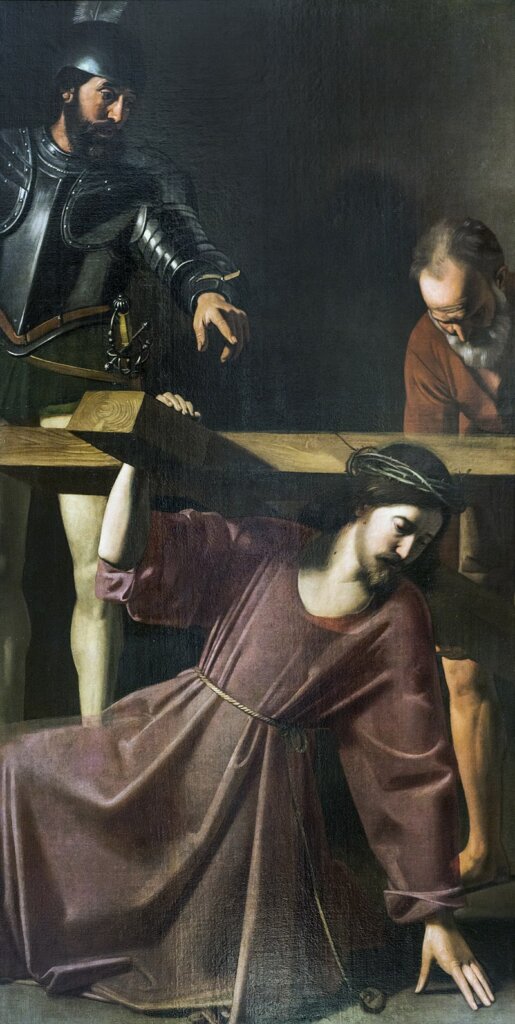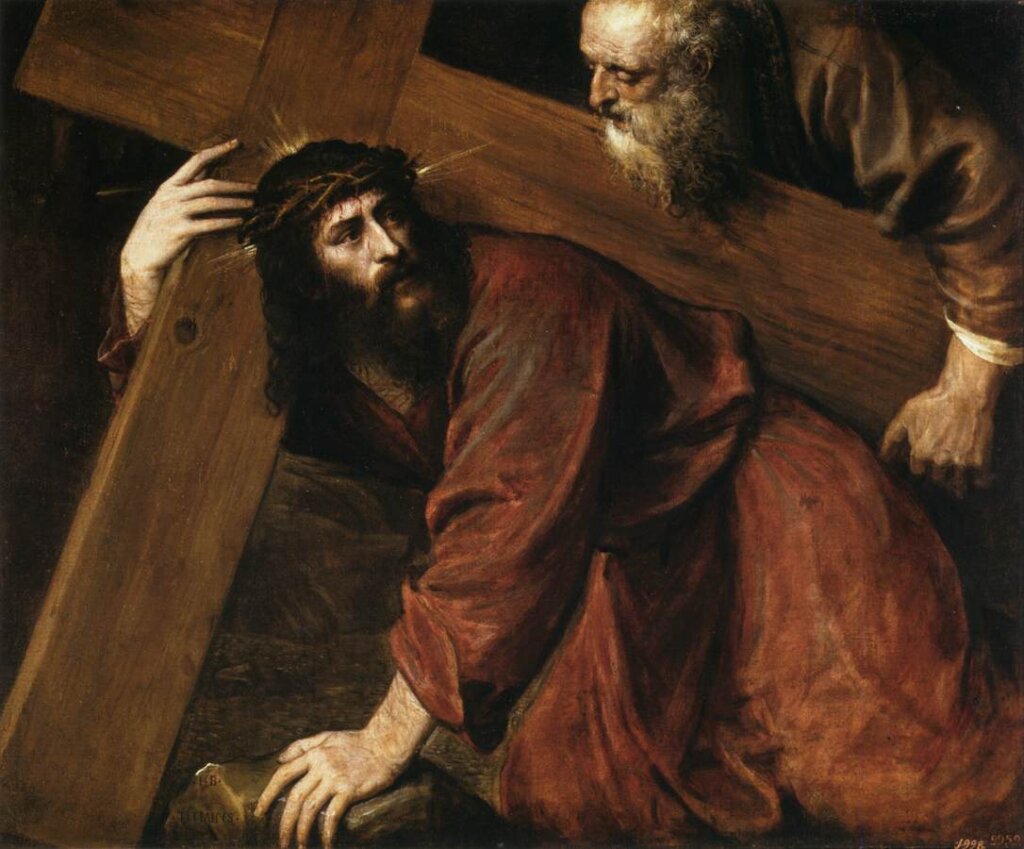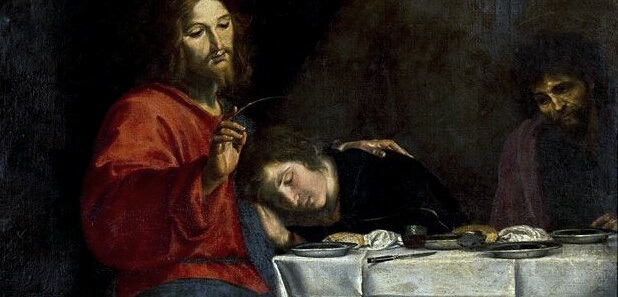
There is something about Simon.
Each time I read the Gospel accounts of the Passion or when I pray the Stations of the Cross, I am moved by the “man from Cyrene” who—when Jesus is too weak to carry His cross—is given the cross to carry for a while.
In none of the accounts does Simon ask if he can assist Jesus. In fact, it seems he was forced to carry the cross.
In both Matthew and Mark’s gospels, we are told that Simon was “pressed” to carry the cross.
Luke’s account reads,
And as they led him away, they seized one Simon of Cyrene, who was coming in from the country, and laid on him the cross, to carry it behind Jesus.
Luke 23:26

The Eastern Church celebrates the feast of St. Simon of Cyrene on December 1st each year.
Not only can we learn about Simon, we can learn about ourselves by taking a closer look at his story.
Simon Didn’t Want to Carry the Cross—Neither Do We
Unlike Veronica, who we encounter shortly after reading about Simon (and who lovingly wipes the face of Jesus), Simon is not seeking to console the suffering Christ when the cross is abruptly laid upon him.
I would like to believe that if I were in the crowd in Jerusalem on that sad and glorious day in which Jesus walked with His cross to Calvary, I would be Veronica, seeking to bring Jesus just a little comfort in His agony; that I might reach out and somehow console Our Lord in his suffering.
Yet, in truth, it is Simon—who must react after the cross is thrust upon him—who touches me and with whom I can more readily relate.
The Bible does not tell us exactly how Simon felt about carrying the cross. Did he curse it on the way? Was he bitter towards the Romans—or toward Jesus, even?
Did his interior self shout “Why me?”
Did the injustice of the cross consume him? In carrying this heavy load, did Simon discover a hidden courage and compassion for the One he carried it for?
I can only wonder what sort of transformation Simon underwent as a result of carrying the cross of Christ.
As Christians, we know that the cross is unavoidable if we want to follow Jesus.
“[H]e who does not take his cross and follow me is not worthy of me.”
Matthew 10:38

We also know that Jesus, being God, could have carried His own cross and never fallen, had He chosen to make use of His supernatural power as God.
Yet He allowed His humanity to “bear the burden” and suffer weakness. While His sacrifice did not require help from us, in God’s plan, Simon bore it too.
The Simon Inside Us
I think I relate to Simon because Simon is me. I don’t seek out the cross, but I must carry it. I have no other choice.
None of us do. It isn’t a question of “Will we bear it?”—it is a question of how we will bear it.
The truth is that, while I often endure the cross, I rarely embrace it.
Any thought of becoming a noble “cross-bearer” dissolves quickly and abruptly upon seeing the messiness or complicated nature of suffering.
I can read all the books in the world about suffering and even understand its efficacious nature, but when it comes to bearing its misery, I often balk. The poetic dimension of the cross (what I envision it might be) becomes the hard reality of what it truly is, and—imagining myself alone in facing it—I easily turn inward. There I often discover (to my alarm), my resentment and bitterness towards suffering.
This resentment is not always present, though. Even as I think about some of the heavier crosses in my life, I see that some are easier to bear than others.
When my husband was diagnosed with 4th stage head and neck cancer seven years ago, there were many low days and terrifying moments, but I soon found myself lifted up and supported by others so that the cross (for me) was surprisingly not so difficult to endure. I ultimately was able to turn to faith and found encouragement there.
On the other hand, when I was confronted with the knowledge that one of my children was struggling with serious anxiety and emotional issues, I felt crushed by the burden. In that time of pain and frustration I was strangely lost and found little consolation, even in my faith.
In the Good Catholic series The Meaning of Suffering, we read:
“When any pain feels excessive or out of the ordinary, we sense that a line has been crossed. Our hearts are no longer content without an explanation.”
How true this sentiment was for me when facing the pain of my child’s psychological struggles.
Suffering that results from the crosses we bear is often fraught with human emotion and anxiety, which is why it’s easier to talk about the cross and much harder to endure it.
As much as I would like to be the example of one who carries her crosses gallantly, the truth is that, more often than not, I simply drag the unwieldy thing along.
Even harder to admit is that while acutely aware of my own suffering, I am often impatient and lacking in empathy towards another’s.
Nothing in the Gospels (or anywhere in scripture, for that matter) is without meaning. We know that Simon is there to teach us something. The cross may be forced upon us, as it was on him, or it might come along when we least expect it. Either way, we have to carry it, and—like Simon—we must help others carry theirs, as well.
Simon Learned True Compassion by Suffering with Jesus
In the movie The Passion of the Christ, the scene in which Simon helps Jesus is particularly powerful. We see at first his reluctance.
But after carrying the cross behind the beaten, scourged, and bloody Jesus, Simon becomes incensed at the soldiers who are relentless in their cruel harassment. He throws down the cross and yells at the mocking soldiers: “Stop! If you don’t stop I will not carry the cross one more step. I don’t care what you do to me!”
In sharing this burden of Christ’s, Simon unites himself with his suffering Lord and develops an empathy that he otherwise would not have experienced.
He who loves the Tremendous Lover sometimes finds, indeed, that pain adds fuel to the flame. Sorrow remarries the soul to God.
Venerable Fulton Sheen, Go to Heaven: A Spiritual Road Map to Eternity

We can imagine that the hours of the Passion were the hardest of Jesus’ life and that, for a little while, Simon helped bear their pain. Perhaps this is why many saints have called the cross a gift.
It is true that looking back at periods of suffering in my life (why is it usually hindsight that brings clarity?), I recognize the undeniable sweetness of the cross.
Venerable Fulton Sheen once said,
The oblation of the soul becomes the condition of changing an agony into sacrifice, and this is not easy. It costs something to come to God, as it cost God something to come to us. When God asks for sacrifice some complain, when a trial comes, they rebel, when temptation assaults, they surrender. Indeed, belief is a yoke, as the Saviour said, but it is a yoke that is sweet and a burden that is light.
Fulton Sheen, Lift Up Your Heart: A Guide to Spiritual Peace
All of us are like Simon. We all must carry crosses in this life.
But hopefully, somewhere along the way, we will come to understand that the pain, disappointments, sorrows, and sufferings of life are also a gift which—carried for Christ—will become sweet and light.



![Don’t Have A Spiritual Director? 5 Things You Can Do To Find One [Video]](https://www.goodcatholic.com/wp-content/uploads/2023/02/HTRTB-Lesson-8-Ellenrieder-Cropped.jpg)

